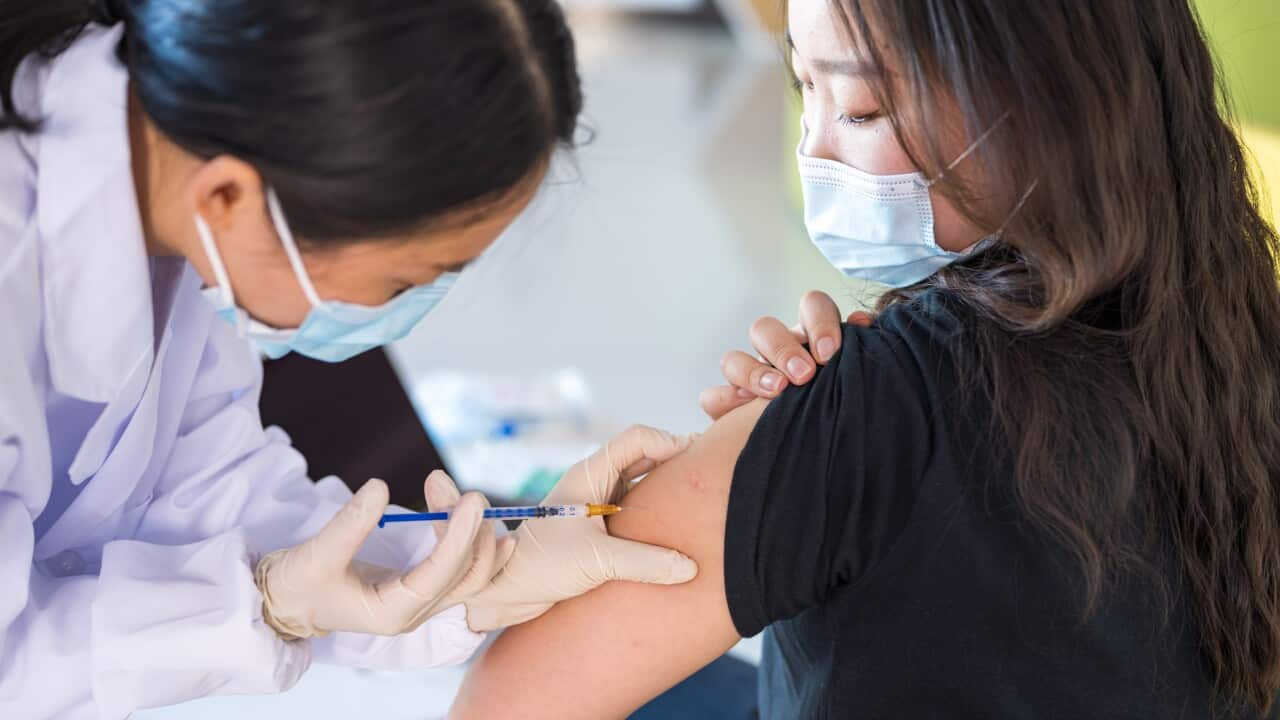Key Points
- All current vaccines have some efficacy: Dr Norelle Sherry
- Australian researchers and others are working on a variant-proof vaccine
- Australia has a high cumulative COVID-19 mortality rate per million population
It's been almost two years since Australia's COVID vaccination began on 22 February 2021.
The federal government offered the first booster on 8 November 2021 and followed up with another dose a few months later.
But data from the Department of Health showed demand for booster doses has remained low among eligible Australians following their two-dose primary vaccination.
About 56.6 per cent of eligible residents (18 years +) have taken a third dose, and 35.2 per cent (30 years+) have taken a fourth dose as at 10 February 2023.
Now, the federal government has announced an additional COVID booster vaccine for adults who haven't had a COVID infection or a vaccine in the past six months.
But how effective are the vaccines against the mutating virus?
COVID virus has mutated since it was first detected in Wuhan in December 2019.
There have been Alpha, Beta, Gamma and Delta variants, but Omicron and its subvariants are believed to have caused more deaths in Australia.
showed Australia's cumulative COVID-19 mortality rate per million population in the past 12 months was 557, slightly lower than the US (585).
But it is much higher than Singapore (149), Canada (407), Japan (408), and the UK (448).

Clinical Microbiologist & Infectious Diseases Physician Dr Norelle Sherry. Credit: Doherty Institute
"But any of the vaccines are far better than no vaccines," Dr Sherry told SBS.
"Vaccines were never really designed to avoid getting COVID completely. But they certainly protect against severe disease, causing hospitalisation.
"The Omicron booster is likely to confer greater immunity than the original vaccines," Dr Sherry said.
Australia advises residents to prefer updated mRNA vaccines over original or protein-based vaccines.
Adults can opt for Pfizer's two bivalent vaccines that target BA.4/5 variants and original variant/BA.1.
They can also choose Moderna's bivalent vaccine that targets the original/BA.1 as boosters.
"Adults aged under 55 who received the Pfizer bivalent BA.4/5 vaccine developed higher neutralising antibody titres to the BA.4/5 Omicron subvariant than those who received the Pfizer original vaccine," the Australian Technical Advisory Group on Immunisation (ATAGI) said in a .
"Neutralisation of newer BQ.1.1 and XBB.1 subvariants was also higher than with the original vaccine," it added.
Australia's drug regulator, the Therapeutic Goods Administration, is currently evaluating Moderna's BA.4/5 booster.
Australia's Chief Medical Officer Paul Kelly recently said the primary purpose of current policy is to protect the most vulnerable and vaccination remains a key plank.
"UK modelling, for example, shows that for anyone over 70, you need to vaccinate 800 people to stop one hospitalisation. In comparison, from age 40 to 49, you need to vaccinate 92,000 people," Professor Kelly said.
"And if you look at younger people, every year younger than that, you need to vaccinate more to get that effect."
Do we need regular boosters moving forward?
In the past, ATAGI said regular doses like influenza or flu vaccine are "likely", particularly for those at the highest risk of severe disease.
Professor Chris Goodnow at the Garvan Institute of Medical Research said there was an "urgent need for a variant-proof COVID-19 vaccine."
Garvan has teamed up with the UNSW RNA institute and the Kirby Institute to develop a universal mRNA COVID-19 vaccine, which could end the need to update a booster every time a new variant emerges.
How about antivirals?
Oral treatments have been described as a "game changer".
But despite their introduction last year, more than 2,600 Australians, including 800 aged care residents, have died.
Dr Sherry, however, still calls them a "game changer."
She said the issue is more about people needing access or getting access early, which comes down to more testing for the virus.
People are less vigilant in seeking diagnosis and treatment for COVID
Antivirals must be taken as soon as possible from the onset of symptoms.
Dr Sherry said it is essential for people who are in the at-risk groups to be vigilant about testing for COVID and talk to their doctors early about antivirals.
Second-generation antivirals
Scientists and pharmaceutical companies around the world are working on second-generation antivirals to combat the shortcomings of the current oral treatments.
Pfizer has a second-generation antiviral in the works, while Chinese companies are working on an oral antiviral treatment, VV116 with promising preliminary studies.
Australian scientists are working on synthetic antibodies as antiviral drugs. They aim to launch clinical trials this year.
SBS is committed to providing all COVID-19 updates to Australia’s multicultural and multilingual communities. Stay safe and stay informed by visiting regularly the


